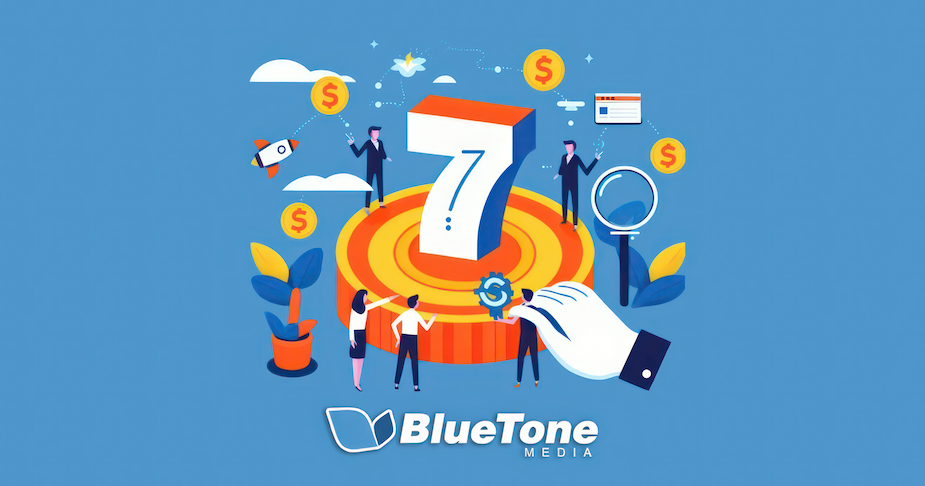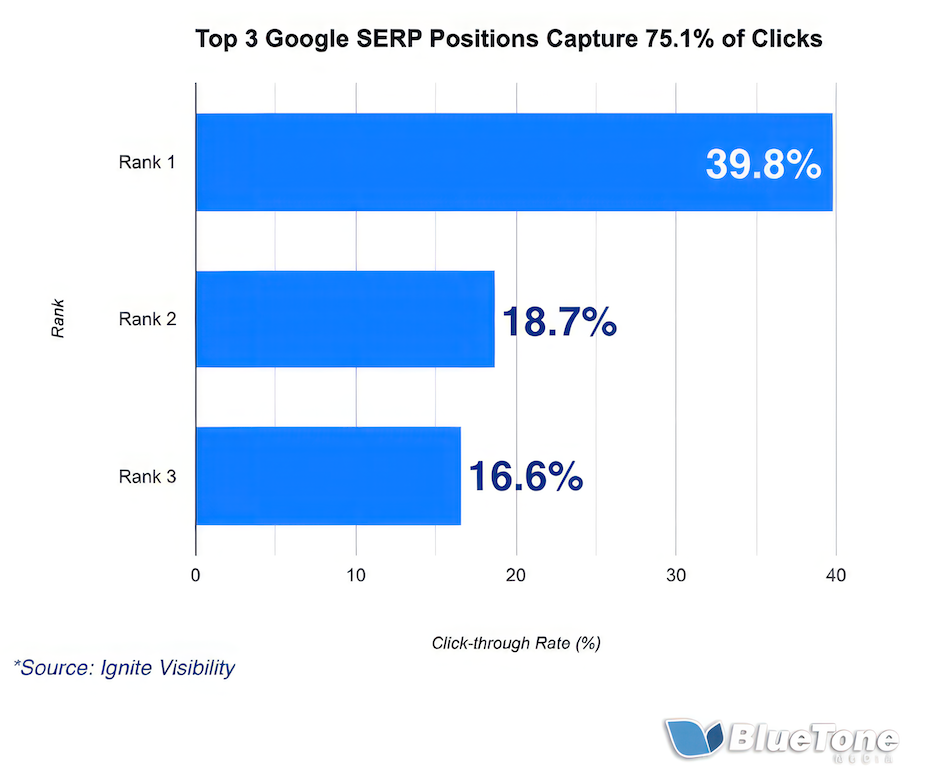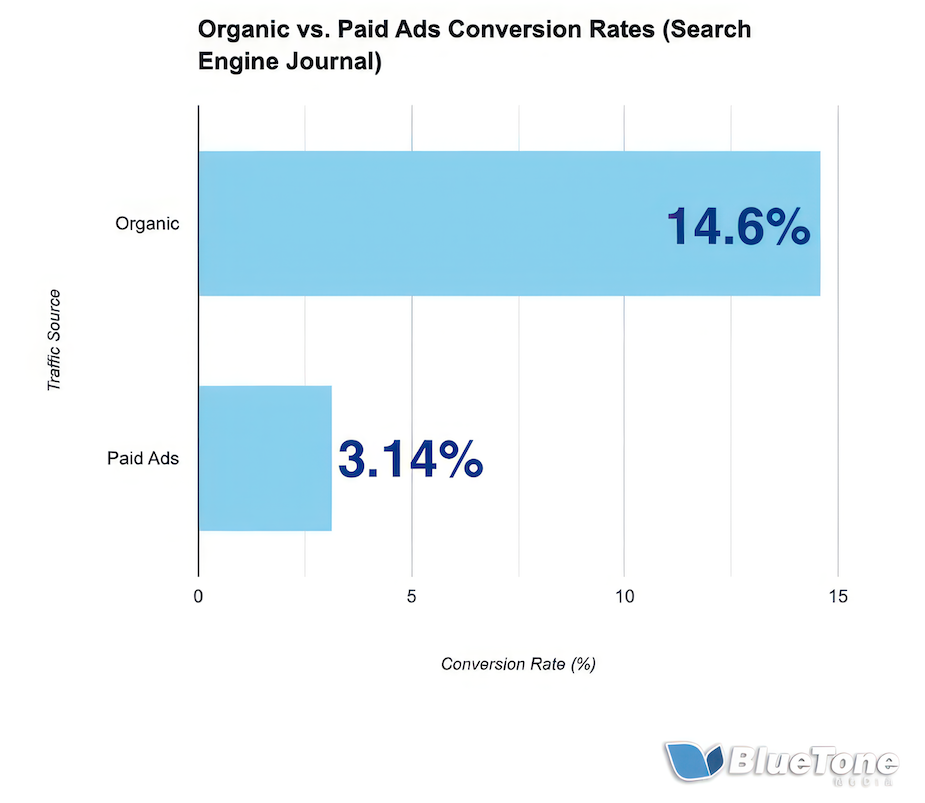7 Reasons It's ABSOLUTELY Worth Paying For SEO
By: Hayden Jarman

Hey there, small business owners!
Ever wondered what all the buzz is about when it comes to Search Engine Optimization (SEO)? Well, you're in the right place.
Today, we're going to dig deep into the world of SEO. We'll unravel the mysteries, debunk some myths, and explore the incredible ways SEO can work wonders for your small business.
So, let's roll up our sleeves and dive into why investing in professional SEO services is a smart move for you.
Key Takeaways:
- SEO is an essential strategy for small business owners, offering long-term value and ROI.
- Investing in SEO can increase organic traffic, improve brand awareness, and save costs compared to paid ads.
- Targeted audience reach, enhanced user experience, and measurable results make SEO worth the investment.
- SEO professionals adapt to algorithm changes, future-proofing your online presence.
Table of Contents:
- Is it worth paying for SEO?
- SEO vs. Ads
- Is an SEO audit worth the cost?
- Optimizing for Performance and Speed
- Why most SEO 'best practices' are outdated
- What makes a domain SEO-friendly?
- Are keywords still important?
- Are paid links bad for SEO?
- Why 'guaranteed rankings' are a scam
- Are videos good for SEO?
Is it worth paying for SEO?
Now, you might be wondering, "Is it worth paying for SEO?" The answer is a resounding yes, and here's why:
Reason 1: Increased Organic Traffic
Let's start with the good stuff – more visitors to your website! SEO is all about helping your website rank higher in search engine results pages (SERPs).
This means that when potential customers search for products or services related to your business, they're more likely to discover your website.
In fact, organic search contributes significantly to website traffic, often outperforming other acquisition channels.
Check this out:
| Organic Traffic | Conversion Rate |
| 60% | 14.6% |
Not only do you get more organic traffic, but it also converts into customers at a higher rate. That's a win-win!
Reason 2: Improved Brand Awareness and Credibility
Imagine your small business consistently appearing at the top of search results – that's a fantastic way to boost your brand recognition and credibility.

When your website is visible in the top positions, users trust your brand more. It builds a positive online reputation and solidifies your brand identity, helping you stand out in a competitive market.
Reason 3: Cost-Effectiveness Compared to Paid Ads
While paid advertising might seem like a quick fix, it can be costly. SEO, on the other hand, provides a more cost-effective and sustainable solution.

Let's break it down:
| SEO (Cost-Per-Acquisition) | Google Ads (Cost-Per-Click) |
| Lower cost over time | Ongoing expenses |
Investing in SEO means that once your website ranks well, you can enjoy a steady stream of organic traffic without the continuous financial commitment required by paid advertising platforms.
Reason 4: Targeted Audience Reach
With SEO, you can tailor your content to specific keywords and search intent, ensuring that you reach your ideal audience – the people most likely to become your customers.
This targeted approach is more efficient than paid advertising, which may attract irrelevant traffic that doesn't align with your small business goals.
Reason 5: Enhanced User Experience
SEO isn't just about rankings; it's about creating a better user experience. A well-optimized site tends to be more user-friendly with smoother navigation, faster loading times, and more engaging content.
These improvements not only delight your visitors but also have a positive impact on your search engine rankings.
Reason 6: Measurable Results and Data-Driven Optimization
Forget about vague marketing efforts. SEO campaigns are trackable and analyzable. Tools like Google Analytics provide insights into user behavior, conversion rates, and more.
This data empowers you to make informed decisions and continually optimize your SEO strategies for better results.
Reason 7: Future-Proofing for Search Algorithm Updates
Search engines change their algorithms constantly. Professional SEO services ensure your strategies stay up-to-date with these changes.
This continuous optimization is essential to keep your small business visible and maintain your ranking stability.
SEO vs. Ads
Now that we've explored the seven compelling reasons to invest in SEO, let's compare and contrast it with paid advertising to help you make an informed decision for your small business.
| Aspect | SEO | Paid Advertising |
| Cost | Lower initial cost, long-term value | Immediate cost, ongoing expenses |
| Visibility | Organic, long-lasting | Paid, temporary |
| Targeting | Precise audience targeting | Broader audience, potential waste |
| Credibility | Builds trust and authority | Immediate, may lack credibility |
| Sustainability | Sustainable, long-term benefits | Dependent on budget |
Your choice between SEO and paid advertising depends on your small business goals and budget. SEO offers sustainable growth and credibility, while paid advertising provides immediate visibility but may incur ongoing costs.
Is an SEO audit worth the cost?
Now, you might be wondering if investing in an SEO audit is worth it. Absolutely! An SEO audit is a valuable tool that can uncover technical issues, content gaps, and optimization opportunities to improve your website's performance.
It provides a roadmap for enhancing your SEO strategies and ensuring that your online presence aligns with best practices. Discover hidden potential and maximize the impact of your SEO efforts with an SEO audit.
Optimizing for Performance and Speed
Now, let's talk about something crucial for your small business website – performance and speed. It's not just about how your website looks; it's about how fast it loads and how smoothly it runs.
Here are some actionable tips to enhance your website's performance:
Image Optimization
- Reduce Image Sizes: Compress images to reduce file sizes without compromising quality.
- Use Proper Formats: Choose the right image format (JPEG, PNG, etc.) based on the type of image.
- Lazy Loading: Implement lazy loading to load images as users scroll, improving initial page load times.
Code Minification
- Minimize CSS and JavaScript: Minify CSS and JavaScript files to reduce their size.
- Remove Unnecessary Code: Get rid of unused or redundant code that slows down your website.
Caching Mechanisms
- Leverage Browser Caching: Configure your server to instruct browsers to cache static assets, reducing server load.
- Content Delivery Network (CDN): Use a CDN to distribute website content globally and deliver it faster to users.
By optimizing for performance and speed, your small business website can provide an exceptional user experience, which not only pleases visitors but also positively impacts your search engine rankings.
Why most SEO 'best practices' are outdated
In the ever-evolving world of SEO, what was considered a 'best practice' yesterday might not hold true today.
As a small business owner, it's crucial to understand that SEO tactics and strategies continuously evolve with changes in search engine algorithms.
Here's why staying up-to-date is essential:
- Algorithm Changes: Search engines frequently update their algorithms to deliver better results to users.
- User Behavior: Changes in how users search and interact with the web also influence SEO strategies.
- Competition: Your competitors are likely adapting their SEO tactics, and you must keep up.
To succeed in SEO, continuous learning and adaptation are key. What worked last year may not work today, and being informed about the latest trends and updates is crucial to staying ahead of the curve.
What makes a domain SEO-friendly?
Let's dig into the fundamentals of an SEO-friendly domain for your small business. Your domain plays a vital role in your online presence.
Here are the factors to consider:
- Domain Name Structure: Choose a domain name that is relevant to your business and includes keywords if possible.
- Content Relevance: Ensure your website content aligns with your domain's theme and keywords.
- Backlink Profile: Build a strong backlink profile with high-quality, relevant links pointing to your domain.
By paying attention to these factors, you can create an SEO-friendly domain that enhances your small business's online visibility.
Are keywords still important?
Absolutely, keywords are still crucial in SEO! However, the landscape has evolved. It's not just about inserting keywords; it's about strategic keyword research and content creation.
Here's what you need to know:
- Keyword Research: Identify relevant keywords that match user search intent.
- Semantic Search: Understand that search engines now consider context and user intent, not just exact keyword matches.
- Content Quality: Create high-quality, valuable content that naturally incorporates keywords.
Keywords have transformed from simple phrases into patterns of search intent, and optimizing for these patterns is essential for your small business's SEO success.
Are paid links bad for SEO?
The idea that all paid links are harmful for SEO is a misconception. It's about the quality and relevance of those paid links.
Here's the difference:
- High-Quality Paid Links: If you pay for links from reputable sources that are relevant to your niche, they can be valuable.
- Spammy, Low-Quality Links: Acquiring links from spammy or irrelevant sources can harm your SEO efforts.
For small businesses, it's crucial to focus on building relationships and earning high-quality, relevant backlinks that genuinely benefit your website's authority.
Why 'guaranteed rankings' are a scam
Beware of SEO companies that promise guaranteed rankings in search results.
Such guarantees are unrealistic because:
- Complex Algorithms: Search engine algorithms are intricate and continually evolving.
- Competitive Landscape: Ranking depends on various factors, including competition in your niche.
- Ethical Practices: Achieving rankings through unethical tactics can result in penalties.
There are no shortcuts in SEO, and ethical, sustainable strategies are the way to go for long-term success.
Are videos good for SEO?
Absolutely! Incorporating videos into your SEO strategy can bring several benefits:
- Improved Engagement: Videos engage users, keeping them on your site longer.
- Longer Dwell Time: When users watch videos, they spend more time on your site, signaling quality to search engines.
- Increased Social Shares: Engaging videos are more likely to be shared on social media, expanding your reach.
To make the most of videos for SEO, optimize video content for search engines and utilize video hosting platforms effectively.
Final Thoughts
SEO is not just a buzzword; it's a game-changer for small businesses like yours. It offers sustainable growth, improved visibility, and cost-effective results.
To maximize the impact of your SEO efforts, consider seeking professional guidance and staying informed about the ever-evolving world of SEO.
Your small business's online success awaits, and SEO is the path to get there.
Related Posts:
- Understanding Google’s Local Pack: How to Get Featured
- Google Business Profile FAQs: Everything You Need to Know
- The Best Google Ads Extensions to Boost Your Click-Through Rates
- How to Leverage Facebook Groups for Local Business Leads
- How to Use AI to Write Better Social Media Captions
- How to Optimize Google Reviews to Attract More Customers
- LinkedIn for B2B Marketing Success
- How to Conduct a Social Media Audit (w/ "Audit Readiness" Quiz!)
- Creating a Content Calendar for Consistent Posting
- The Importance of Mobile Optimization in 2024
- Data Privacy Regulations: What Marketers Need to Know
- The Role of Chatbots in Enhancing Customer Service
- SEO for Small Business: The Ultimate Guide to Getting Found Online
- The Role of Keyword Clustering in Modern SEO

